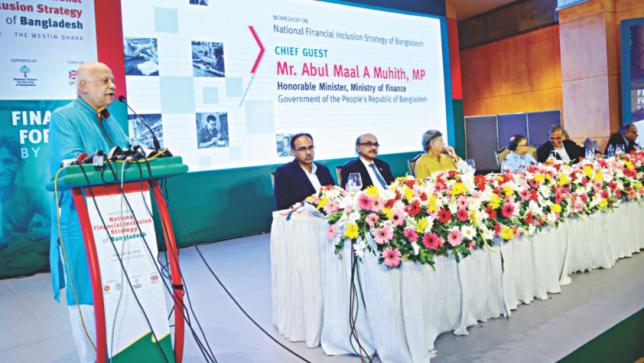Increase bank branches to reach out to poor: Muhith

Banks should increase their number of branches to give a boost to financial inclusion, said Finance Minister AMA Muhith yesterday.
All the banks together have less than 10,000 branches across the country.
“This is not enough to provide financial services to the country's 16 crore people,” he told a workshop on the National Financial Inclusion Strategy (NFIS) at the capital's The Westin hotel.
The central bank and the bank and financial institutions division of the finance ministry organised the workshop in association with the Business Finance for the Poor in Bangladesh (BFP-B) project funded by the UK Aid.
The government would take more initiatives to extend banking services to the underprivileged people, said MA Mannan, state minister for finance and planning.
It is also trying to give a boost to financial inclusion by way of increasing the number of outlets of mobile and agent banking.
Area specific focus is highly important to render financial services to the disadvantaged people, said Fazle Kabir, Bangladesh Bank governor.
He also underscored the need to improve financial literacy of the general public as it will play a role in encouraging them to take service from financial institutions.
It is frequently mentioned that about 8.5 crore people in Bangladesh have bank accounts, said Md Julhas Uddin, a general manager of the central bank.
“The figure is not correct as many individuals have multiple bank accounts. So, we should ensure data accuracy to take the financial inclusion programme forward.”
He also said innovative financial products should be introduced to bring the people in the hill tracts, char areas and remote parts of the country under the financial sector.
Merely opening of a bank account does not mean financial inclusion, said Toufic Ahmad Choudhury, director general of the Bangladesh Institute of Bank Management. The financial inclusion agenda will get real momentum when the accountholders will enjoy loans from banks for business purposes, he added.
At present, marginal people have to count interest rate at 25 to 26 percent to get loans, said Md Eunusur Rahman, senior secretary to the finance ministry.
“We should take initiatives to disburse loans at a lower rate to the marginal people,” he added.
Deposits collected by bank branches in rural areas were frequently invested in urban areas, said AKM Kamrul Islam, director of Sonali Bank.
“The trend means that the entrepreneurs of the rural areas are being deprived of getting loans.” At least, 50 percent of the deposits from rural areas should be invested there, he added. The central bank and the finance ministry took an initiative in 2016 to develop a complete draft of NFIS with support from the UK government.
The final draft along with diagnostic study report will be submitted to the cabinet soon.
Abul Kalam Azad, principal coordinator of Sustainable Development Goals affairs of the Prime Minister's Office; Abdur Rouf Talukder, secretary (in charge) to the finance division; Jane Edmondson, country representative of DFID Bangladesh; and MK Mujeri, lead consultant of NFIS report, also spoke.
